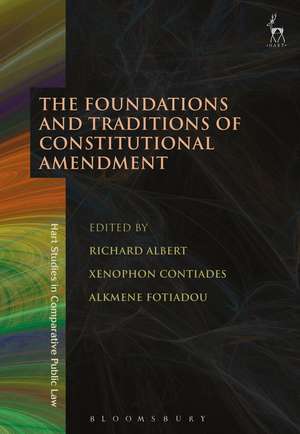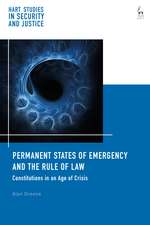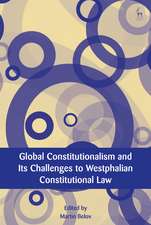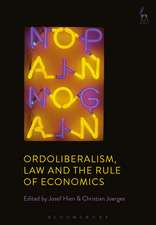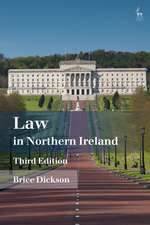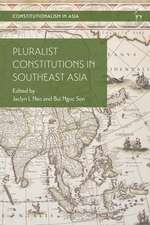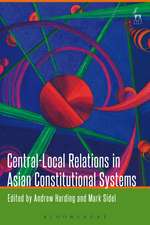The Foundations and Traditions of Constitutional Amendment: Hart Studies in Comparative Public Law
Editat de Richard Albert, Professor Xenophon Contiades, Dr Alkmene Fotiadouen Limba Engleză Hardback – 12 iul 2017
| Toate formatele și edițiile | Preț | Express |
|---|---|---|
| Paperback (1) | 440.31 lei 43-57 zile | +84.29 lei 5-11 zile |
| Bloomsbury Publishing – 27 noi 2019 | 440.31 lei 43-57 zile | +84.29 lei 5-11 zile |
| Hardback (1) | 897.62 lei 43-57 zile | |
| Bloomsbury Publishing – 12 iul 2017 | 897.62 lei 43-57 zile |
Din seria Hart Studies in Comparative Public Law
- 22%
 Preț: 270.67 lei
Preț: 270.67 lei - 18%
 Preț: 305.41 lei
Preț: 305.41 lei - 18%
 Preț: 323.38 lei
Preț: 323.38 lei -
 Preț: 380.87 lei
Preț: 380.87 lei - 23%
 Preț: 386.15 lei
Preț: 386.15 lei - 22%
 Preț: 251.39 lei
Preț: 251.39 lei - 18%
 Preț: 440.31 lei
Preț: 440.31 lei - 22%
 Preț: 227.81 lei
Preț: 227.81 lei - 22%
 Preț: 270.67 lei
Preț: 270.67 lei - 22%
 Preț: 273.42 lei
Preț: 273.42 lei - 27%
 Preț: 349.13 lei
Preț: 349.13 lei - 22%
 Preț: 272.51 lei
Preț: 272.51 lei - 22%
 Preț: 270.49 lei
Preț: 270.49 lei - 22%
 Preț: 226.42 lei
Preț: 226.42 lei - 23%
 Preț: 171.85 lei
Preț: 171.85 lei - 30%
 Preț: 576.15 lei
Preț: 576.15 lei - 30%
 Preț: 900.07 lei
Preț: 900.07 lei - 18%
 Preț: 380.74 lei
Preț: 380.74 lei - 21%
 Preț: 279.85 lei
Preț: 279.85 lei - 22%
 Preț: 251.75 lei
Preț: 251.75 lei - 17%
 Preț: 315.19 lei
Preț: 315.19 lei - 18%
 Preț: 321.78 lei
Preț: 321.78 lei - 21%
 Preț: 236.30 lei
Preț: 236.30 lei - 18%
 Preț: 321.78 lei
Preț: 321.78 lei - 30%
 Preț: 960.98 lei
Preț: 960.98 lei - 22%
 Preț: 271.94 lei
Preț: 271.94 lei - 22%
 Preț: 239.59 lei
Preț: 239.59 lei - 18%
 Preț: 322.15 lei
Preț: 322.15 lei - 22%
 Preț: 264.17 lei
Preț: 264.17 lei - 22%
 Preț: 264.57 lei
Preț: 264.57 lei
Preț: 897.62 lei
Preț vechi: 1145.24 lei
-22% Nou
Puncte Express: 1346
Preț estimativ în valută:
171.76€ • 179.81$ • 142.12£
171.76€ • 179.81$ • 142.12£
Carte tipărită la comandă
Livrare economică 07-21 aprilie
Preluare comenzi: 021 569.72.76
Specificații
ISBN-13: 9781509908257
ISBN-10: 1509908250
Pagini: 416
Dimensiuni: 169 x 244 x 32 mm
Greutate: 0.91 kg
Editura: Bloomsbury Publishing
Colecția Hart Publishing
Seria Hart Studies in Comparative Public Law
Locul publicării:London, United Kingdom
ISBN-10: 1509908250
Pagini: 416
Dimensiuni: 169 x 244 x 32 mm
Greutate: 0.91 kg
Editura: Bloomsbury Publishing
Colecția Hart Publishing
Seria Hart Studies in Comparative Public Law
Locul publicării:London, United Kingdom
Caracteristici
Analyses a wide range of jurisdictions, including the US, Australia, Canada, and European, Caribbean and African countries.
Notă biografică
Richard Albert has been appointed Professor of Law at Boston College Law School and visiting professor at the University of Toronto, Externado University of Colombia, the Interdisciplinary Center (Herzliya) and Yale University.Xenophon Contiades is Professor of Public Law, Panteion University of Social and Political Sciences (Athens, Greece) and Managing Director of the Centre for European Constitutional Law. Alkmene Fotiadou is Research Associate at the Centre for European Constitutional Law.
Cuprins
Introduction: The State of the Art in Constitutional Amendment Richard AlbertI. Defining the Field II. The Architecture of Constitutional Amendment Rules III. Amendment as Constitution Part I: The Foundations of Constitutional Amendment1. Amendment Power, Constituent Power, and Popular Sovereignty: Linking Unamendability and Amendment ProceduresYaniv RoznaiI. Introduction II. Unamendability and Constituent Power III. The Constitutionalisation of Primary Constituent Power IV. The Spectrum of Constitutional Amendment Powers V. Conclusion 2. Constitutional Theory and Cognitive Estrangement: Beyond Revolutions, Amendments and Constitutional Moments Zoran OklopcicI. Introduction: The Person of 'The People' and A Three-Fold Cognitive Estrangement II. Beyond 'The People': New Tropes, Old Anxieties III. Three Forms of Estrangement-prevention: Holmes, Pettit, Dworkin IV. Tertium Datur: Mapping Constitutional Change Between the Revolution and the Amendment V. Towards a Different Familiarity: 'The People', The Paradox and The Sacrifice 3. Constraints on Constitutional Amendment PowersOran DoyleI. Introduction II. A Doctrine of Unconstitutional Constitutional Amendments III. Constraint and Powers of Constitutional Change IV. The Types of Constraint on Constitutional Amendment Powers V. Distribution of Power and the Justification of Constraint VI. Justification of Constraints on Constitutional Amendment Powers VII. Conclusion 4. Comment on Doyle's Constraints on Constitutional Amendment Powers Mark Tushnet5. Constituting the Amendment Power: A Framework for Comparative Amendment LawThomaz PereiraI. Introduction II. Conclusion 6. Sieyès: The Spirit of Constitutional Democracy? Luisa Fernanda García LópezI. Introduction II. Towards a Representative Democracy III. Towards a Constitutional Democracy IV. Conclusion 7. Revolutionary Reform in Venezuela: Electoral Rules and Historical Narratives in the Creation of the 1999 Constitution Joshua BraverI. Introduction II. Carl Schmitt's Unfortunate Victory over Hannah Arendt in the Analysis of Popular Constitution-Making III. Hannah Arendt's Revolutionary Reform IV. Hugo Chávez's Radical and Original Constituent Power V. The Turning Point: The Electoral Rules for the Constituent Assembly VI. Radical Breaks and Exclusionary Mandates VII. Conclusion
